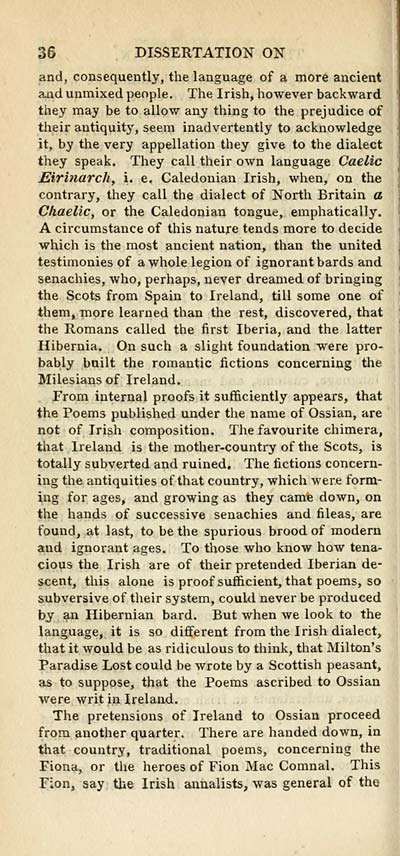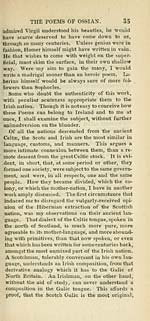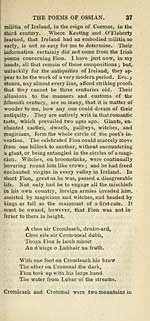Ossian Collection > Poems of Ossian
(84)
Download files
Complete book:
Individual page:
Thumbnail gallery: Grid view | List view

36 DISSERTATION ON
and, consequently, the language of a more ancient
amd unmixed people. The Irish, however backward
they may be to allow any thing to the prejudice of
their antiquity, seem inadvertently to acknowledge
it, by the very appellation they give to the dialect
they speak. They call their own language Gaelic
Eirinarch, i. e, Caledonian Irish, when, on the
contrary, they call the dialect of North Britain a
Ckaelic, or the Caledonian tongue, emphatically,
A circumstance of this nature tends more to decide
which is the most ancient nation, than the united
testimonies of a whole legion of ignorant bards and
senachies, who, perhaps, never dreamed of bringing
the Scots from Spain to Ireland, till some one of
them, more learned than the rest, discovered, that
the Romans called the first Iberia, and the latter
Hibernia. On such a slight foundation were pro-
bably built the romantic fictions concerning tlie
Milesians of Ireland.
From internal proofs it sufficiently appears, that
the Poems published under the name of Ossian, are
not of Irish composition. The favourite chimera,
that Ireland is the mother-counti-y of the Scots, is
totally subverted and ruined. The fictions concern-
ing the antiquities of that country, which were form-
ing for ages, and growing as they came down, on
the hands of successive senachies and fileas, are
found, at last, to be the spurious brood of modern
aud ignorant ages. To those who know how tena-
cious the Irish are of their pretended Iberian de-
scent, this alone is proof sufficient, that poems, so
subversive of their system, could never be produced
by an Hibernian bard. But when we look to the
language, it is so different from the Irish dialect,
that it would be as ridiculous to think, that Milton's
Paradise Lost could be wrote by a Scottish peasant,
as to suppose, that the Poems ascribed to Ossian
were writ in Ireland.
The pretensions of Ireland to Ossian proceed
from another quarter. There are handed down, in
that country, traditional poems, concerning the
Fiona, or the heroes of Fion Mac Comnal. This
Fion, say the Irish annalists, was general of the
and, consequently, the language of a more ancient
amd unmixed people. The Irish, however backward
they may be to allow any thing to the prejudice of
their antiquity, seem inadvertently to acknowledge
it, by the very appellation they give to the dialect
they speak. They call their own language Gaelic
Eirinarch, i. e, Caledonian Irish, when, on the
contrary, they call the dialect of North Britain a
Ckaelic, or the Caledonian tongue, emphatically,
A circumstance of this nature tends more to decide
which is the most ancient nation, than the united
testimonies of a whole legion of ignorant bards and
senachies, who, perhaps, never dreamed of bringing
the Scots from Spain to Ireland, till some one of
them, more learned than the rest, discovered, that
the Romans called the first Iberia, and the latter
Hibernia. On such a slight foundation were pro-
bably built the romantic fictions concerning tlie
Milesians of Ireland.
From internal proofs it sufficiently appears, that
the Poems published under the name of Ossian, are
not of Irish composition. The favourite chimera,
that Ireland is the mother-counti-y of the Scots, is
totally subverted and ruined. The fictions concern-
ing the antiquities of that country, which were form-
ing for ages, and growing as they came down, on
the hands of successive senachies and fileas, are
found, at last, to be the spurious brood of modern
aud ignorant ages. To those who know how tena-
cious the Irish are of their pretended Iberian de-
scent, this alone is proof sufficient, that poems, so
subversive of their system, could never be produced
by an Hibernian bard. But when we look to the
language, it is so different from the Irish dialect,
that it would be as ridiculous to think, that Milton's
Paradise Lost could be wrote by a Scottish peasant,
as to suppose, that the Poems ascribed to Ossian
were writ in Ireland.
The pretensions of Ireland to Ossian proceed
from another quarter. There are handed down, in
that country, traditional poems, concerning the
Fiona, or the heroes of Fion Mac Comnal. This
Fion, say the Irish annalists, was general of the
Set display mode to: Large image | Transcription
Images and transcriptions on this page, including medium image downloads, may be used under the Creative Commons Attribution 4.0 International Licence unless otherwise stated. ![]()
| Early Gaelic Book Collections > Ossian Collection > Poems of Ossian > (84) |
|---|
| Permanent URL | https://digital.nls.uk/77989877 |
|---|
| Description | Selected books from the Ossian Collection of 327 volumes, originally assembled by J. Norman Methven of Perth. Different editions and translations of James MacPherson's epic poem 'Ossian', some with a map of the 'Kingdom of Connor'. Also secondary material relating to Ossianic poetry and the Ossian controversy. |
|---|
| Description | Selected items from five 'Special and Named Printed Collections'. Includes books in Gaelic and other Celtic languages, works about the Gaels, their languages, literature, culture and history. |
|---|

